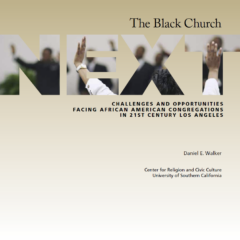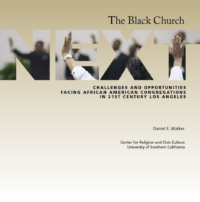Despite lingering vestiges of structural racism, an entrenched economic downturn, and changing community demographics, a 2011 Washington Post-Kaiser Family Foundation-Harvard University poll found that 85 percent African Americans were still optimistic about the future.12 In addition to this generalized hope, another 59 percent felt that America’s best years were yet to come. Citing the Presidency of Barack Obama as one of the key reasons for their optimism, African Americans were easily the most hopeful demographic in the nation.
It is this considerable “asset of spirit” that faith leaders and congregations in Los Angeles must recognize, appreciate, and nurture. While it is easy to assume that the grass is indeed greener in other religious, historic, or racial pastures, the reality is that the African American church is still one of the most important social and religious institutions in the city and nation.
With a community whose numbers would rank it as one of America’s most populous cities if it stood alone, faith leaders must mine the well of spiritual renewal that allows them to shape a rhetoric and ministry that views Los Angeles, and its Black religious community, as one of opportunity and promise. Although it is very true that the city has changed considerably over the past four decades, those immersed in the work of faith must embrace change as a sign of vibrancy and life.
As the church looks to the future it must recognize that in addition to coming from a space of historic relevance it still maintains a lofty place in the hearts and minds of African Americans. Moving deeper into the 21st century, its ability to inspire and organize its considerable human assets, in spite of new challenges, will be the key to maintaining that status.
In the most appropriate laboratory for the country’s yet-to-be-perfected experiment in both diversity and democracy, Los Angeles faith leaders of all races and traditions share a heavy burden. Unlike their forerunners who lived in a social space defined by a black/white racial and social discourse, the 21st century requires a spiritual and political understanding that exists alongside a myriad of languages, racial backgrounds, and religious traditions. In this new reality, the common denominators must be a love for humanity, search for truth, and embrace of justice—not just for African Americans, but for all of God’s people.
It is this faith space that the African American church must inhabit if it expects to remain relevant. Locking hands across gender, language, class,
and plethora of “isms,” it is the inclusive Black Church, steeped in history yet never enslaved by it, that will birth a more just and equitable city,
nation, and world.
Daniel Walker was a research associate with the USC Center for Religion and Civic Culture until 2012.


